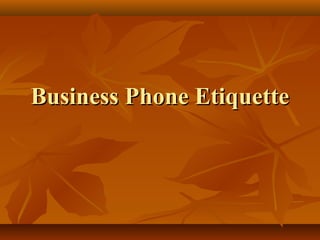
Business phone etiquette
- 2. The Telephone and You Provide helpful hints and proven techniques Part of doing business means doing business over the phone Phone is an important instrument in daily business
- 3. Ways to Sound as Good as You Really Are! Alertness Show that you are wide-awake, ready to engage in a conversation Pleasantness Put a smile in your voice Naturalness Use, simple, straightforward lang.; avoid technical terms/slang Distinctiveness Speaks directly into the phone; Use a normal tone of voice, the louder you are, the louder everyone else becomes Expressiveness Talk at a moderate rate and volume, but vary your voice tone
- 4. Don’ts Frown Mutter Sound Tired Speak in a Shrill Voice Speak Negatively Ramble
- 5. Do’s Smile (they really can hear it!) Speak Clearly and Concisely Be Enthusiastic Lower the Pitch of your Voice Talk in a Positive Mood Listen/Discuss
- 6. Mental P.I.C.T.U.R.E. P – itch High or low? Low carries better and is also more pleasant I – nflection Use voice to express ideas or moods Don’t talk in a monotone The voice naturally rises on a questions or inquiry Voices fall at a “period,” decision or completion
- 7. Mental P.I.C.T.U.R.E. C – ourtesy Common, everyday applies the same as face-to- face conversation T – one Many times it is not what you say, but how you say it Voice should reflect sincerity, pleasantness, confidence, and interest
- 8. Mental P.I.C.T.U.R.E. U – nderstanding Avoid talking with anything in your mouth (gum, pencil) R – ate Rate of speech should be adapted to personality of contact “Fast talkers” can arouse suspicion “Slow talkers” can be irritating E – nunciate Clear enunciation will help avoid misunderstanding and need to repeat yourself
- 9. Keys to Good Listening Limit your talking Can’t talk and listen at the same time Don’t Interrupt A pause doesn’t always mean the individual is finished speaking Concentrate Focus on the conversation. Practice shutting out outside distractions and personal concerns
- 10. Keys to Good Listening Take Notes Helps you remember important points Listen for ideas….not just words Get the whole picture, not isolated bits and pieces Interjections An occasional, “Yes,” “I see,” etc. shows that your listening. However, don’t overuse them
- 11. Create a Good First Impression Try to answer the phone on the SECOND ring Answer with a friendly greeting Smile - it shows, even through the phone Ask the caller their name, even if their name is not necessary for the call, and use it! Keep the phone two-finger widths from your mouth
- 12. Putting Callers on Hold Always ask for permission Examples “Would you holding while I get your file?” “Can you hold briefly while I see if Mr. Jones is available?” Always thank the caller for holding
- 13. Transferring a Caller Always transfer the caller to the desired person’s extension, not to the operator Limits number of transfers Saves the caller time from explaining issue again Tell the caller who you are transferring them to Announce the caller to the person you are transferring
- 14. Taking Phone Messages Phone Message should always include: Caller’s name and company name (if applicable) Time and Date of call What the call is regarding (if possible) If a follow up or return call is needed Phone number (office or home)
- 15. Leaving a Voice/Phone Message Phone Message should always include: Your name and company name Time and Date of call What the call is regarding (brief) If a follow up or return call is needed Phone number (office or home) speak SLOWLY even repeat the phone number – include area code
- 16. Last Impressions Before ending the call, always… Make sure you answered all the caller’s questions Always end with e pleasantry: Have a nice day It was nice speaking with you Let the caller hand up first
- 17. Don’t give more than your first name Don’t get personal, even if they do Be prepared for rejection – just apologize for bothering them and graciously get off the phone If you need help – get a supervisor Your Phone Message Greeting – make it professional
